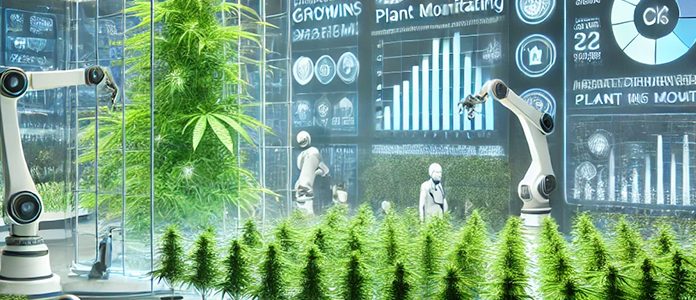The cannabis industry is undergoing a technological revolution, with automation, artificial intelligence (AI), and smart growing systems transforming the way cannabis is cultivated. From data-driven cultivation methods to AI-powered plant monitoring, these innovations are increasing efficiency, sustainability, and yield quality. Here’s how technology is shaping the future of cannabis production.
1. Data-Driven Cultivation
Modern cannabis farms are leveraging big data to optimize plant growth. By collecting and analyzing key metrics—such as temperature, humidity, CO2 levels, and nutrient absorption—growers can make precise adjustments to maximize yield and potency.
Key Benefits:
- Predictable and consistent plant growth
- Optimized resource use, reducing waste
- Early detection of plant stress and deficiencies
Example: Smart sensors embedded in grow rooms can track environmental conditions in real-time, providing growers with actionable insights to fine-tune their cultivation process.
2. Automated Watering and Nutrient Delivery
Gone are the days of manually watering plants on a fixed schedule. Automated irrigation systems use AI and real-time plant monitoring to deliver water and nutrients precisely when needed, ensuring each plant gets the optimal amount.
Key Benefits:
- Reduced water waste and improved sustainability
- Lower labor costs and increased efficiency
- Custom nutrient delivery based on plant stage and strain
Example: Drip irrigation systems with AI integration can measure soil moisture levels and adjust water delivery automatically, preventing under- or over-watering.
3. AI-Powered Plant Monitoring
Artificial intelligence is revolutionizing cannabis cultivation by identifying plant health issues before they become problems. AI-powered cameras and sensors can detect changes in leaf color, growth patterns, and pest infestations, alerting growers in real-time.
Key Benefits:
- Early detection of pests, mold, and nutrient deficiencies
- AI-driven insights for improving plant health and yield
- Reduced reliance on pesticides and chemical treatments
Example: Machine learning algorithms analyze images of cannabis plants to detect signs of powdery mildew, allowing growers to take corrective action before it spreads.
4. Smart Climate Control Systems
Maintaining the ideal climate is crucial for cannabis production. Smart climate control systems automatically adjust temperature, humidity, and airflow to create the perfect growing environment.
Key Benefits:
- Energy efficiency and lower operational costs
- Improved cannabinoid and terpene production
- Consistent growing conditions for high-quality cannabis
Example: IoT-connected HVAC systems adjust climate conditions dynamically based on plant growth stage, reducing electricity use while maintaining optimal conditions.
5. Robotics in Cannabis Cultivation
Robots are playing a growing role in automating repetitive tasks such as trimming, sorting, and packaging. AI-driven robotic systems improve efficiency and consistency in cannabis production facilities.
Key Benefits:
- Faster harvesting and post-processing
- Reduced human labor and operational costs
- Minimized plant damage from manual handling
Example: Automated trimming machines can process cannabis flowers with precision, maintaining quality while increasing production speed.
Conclusion: The High-Tech Future of Cannabis
As the cannabis industry continues to evolve, automation, AI, and smart growing systems will play a central role in improving efficiency, sustainability, and profitability. By integrating these technologies, growers can maximize yields, reduce waste, and ensure consistent, high-quality cannabis production.
With rapid advancements in AI and automation, the future of cannabis cultivation looks brighter than ever. The next wave of innovations will likely bring even more precise and sustainable growing techniques, making cannabis production smarter and more scalable for the global market.


